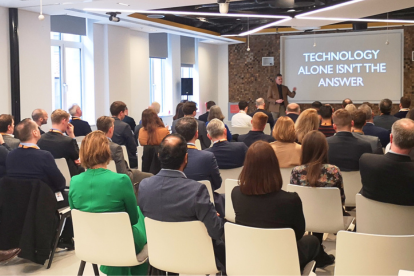Expert: Eric Sharrad, Senior Recruitment Consultant, Pavilion Recruitment Facilitator: Karl Cranswick, Solve
Headlines:
The challenges of adopting new technologies and fostering a culture of innovation within wealth management firms
The resistance to change from advisers, particularly older advisers accustomed to traditional methods, and the need to engage and train younger advisers who are more receptive to technology
Discussion points:
Advisor Resistance to Technology Adoption
The challenges faced by wealth management firms in getting advisers, particularly older and more experienced advisers, to adopt new technologies. There is often resistance to change and a preference for traditional methods.
Factors contributing to this resistance include a lack of understanding of the value and benefits of new technologies, concerns about being replaced by technology, and a general aversion to change.
Younger advisers and new talent tend to be more receptive to technology, but they may also face challenges in learning soft skills and adapting to the industry's culture.
Strategies for Overcoming Resistance
Strategies for overcoming advisor resistance to technology adoption include effective communication and leadership commitment, with leaders needing to clearly articulate the value and benefits of new technologies and set expectations for adoption.
Performance management and accountability measures were also suggested, such as tying technology adoption to performance evaluations and rewards as well as a blended approach combining technology with traditional methods and face-to-face interactions to ease the transition.
Data-driven decision-making and external benchmarking are ways to motivate advisers by demonstrating the potential benefits of technology in terms of efficiency, productivity, and client outcomes.
The Role of Advisor Academies
The role of advisor academies in training new talent and fostering a culture of innovation. While academies provide technical knowledge and qualifications, there is a need to balance this with soft skills development and exposure to new technologies.
Challenges include ensuring that trainers and mentors are aligned with the firm's strategic objectives and are not perpetuating outdated methods.
The use of emerging technologies like AI, VR, and e-learning will enhance training and better prepare new advisers for the evolving industry landscape.
Key takeaways:
- Develop a comprehensive communication plan to clearly articulate the value and benefits of new technologies to advisers, addressing their concerns and highlighting the potential positive impact on productivity, efficiency, and client outcomes
- Establish performance management and accountability measures tied to technology adoption, such as incorporating it into performance evaluations and reward systems
- Implement a blended approach to technology adoption, combining new technologies with traditional methods and face-to-face interactions to ease the transition and address advisor concerns
- Leverage data-driven decision-making and external benchmarking to demonstrate the potential benefits of technology adoption in terms of efficiency, productivity, and client outcomes
- Review and align advisor academy curricula and training methods with the firm's strategic objectives and commitment to innovation, ensuring that trainers and mentors are not perpetuating outdated methods
- Explore the integration of emerging technologies like AI, VR, and e-learning into advisor training programs to better prepare new talent for the evolving industry landscape and foster a culture of innovation


